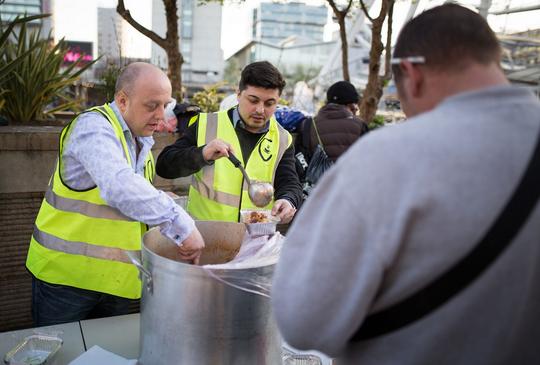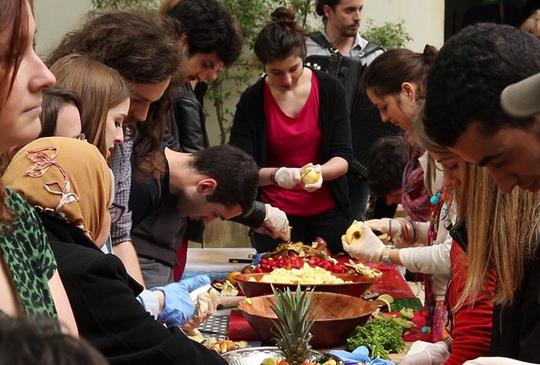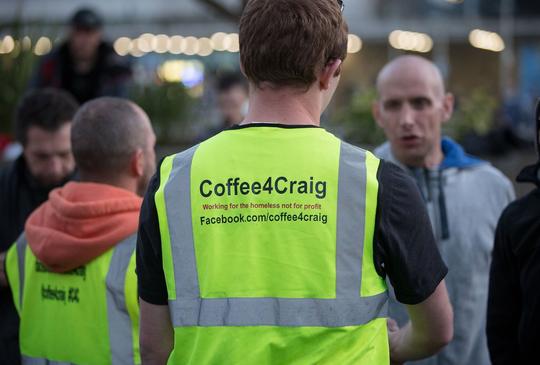
Human Rights Act or human rights: as we squabble, people are going hungry
In life the air quite frequently fizzles out of my little inflatable pedestal. Last week I came over all post-election chill and wrote what I thought was a damning critique of the proposed Human Rights Act repeal and its implications for UK citizens’ Right To Food, only to be told by a long-suffering lawyer friend that the HRA relates to our enshrinement of the European Convention on Human Rights in British law and would thus not affect our international obligations to fulfil the right to food.
Maybe I can be forgiven for being confused by the fact that Human Rights are also constructs shaped by the contours of national, supranational and global political structures. But it did get me thinking- how is the average Jo expected to know their rights, and how they might go about realising them?
If they were equipped with such practical knowledge, would Rights reveal themselves to be a powerful tool or, perhaps, an empty promise that leaves you wishing you’d not known about the Right in the first place?
I had another humbling experience a couple of weeks ago. I spent a Sunday cooking a vat of curry with FoodCycle (from unsold produce donated by supermarkets) and cycling it to a corner of Piccadilly Gardens to dish it out.
We joined Coffee for Craig, an organisation devoted to providing friendship, food and practical advice to the many people without secure homes in Manchester.

While sharing free food, chatting and witnessing, I had a few preconceptions shattered. I expected destitution, and found diversity. I expected alienation, and found articulate anger. I felt uncomfortable at my expectation of gratitude, armed with the knowledge that, no matter how compelled by a ‘something’s-better-than-nothing’ mentality, the sticking plasters of charity can simply prolong the underlying malaise.
However, I found appreciation bolstered by criticism, both gastronomic and political (“I’ll have a smaller portion, please…mmm, that bit of broccoli….is it your use of volunteers that makes you late sometimes?”).
Coffee for Craig, whose founder’s brother Craig died sleeping on the streets, insist on a sense of symbolic parity in this public space: volunteers should not shelter in a gazebo if they want to show solidarity with people constantly exposed to the harshest elements of weather (and social attitude).
They refuse food to nobody- food here is a leveller, requiring no referral slip and no questions asked. It’s a bridge to start conversations, and great conversations I had. As a PhD student I labour for hours to create jazzy presentations of the latest analyses of poverty and food waste, but in the centre of Manchester I found what I knew all along- that the people who know most about it (and are well-placed to analyse it) are those experiencing it every single day.
One of the questions close to my heart is whether emergency food aid, be it food banks or soup kitchens, serves to ‘manage’ food corporations’ problem of surplus food and society’s problem of hunger and poverty. Does it thus mask the need to address the structural causes?
As we ate our curry, some of the guys told me- “we’re grateful for the food- please don’t stop coming…but…” and they pointed out the pitfalls- the aforementioned reliance on volunteers makes us inconsistent with our service, and sometimes downright unreliable. The food isn’t always what they want to eat, and once a week is far from enough. And why isn’t the council or the government helping? That wasn’t from a textbook, but spoken between mouthfuls of food.
I’m ashamed that I was surprised that these people were so clued up about their own situation, and the complexities of food aid. But it dawned on me that those who are most clued up are the ones who need to be clued up.

You need to know your rights when you’re vulnerable- one key function of Human Rights is to serve as a tool of last-resort to hold responsible agencies to account.
One man I spoke to suffers from a major disabling disease but has been denied a home. He knows the government have a duty of care, but he can see no way to claim, no root into the system that can provide it.
A woman told me that hostel provision is worsening, but former sources of help are dwindling along with funding pots- she described homelessness as four walls closing in. She feels dispensable and, from the tone in her voice, desperate.
While my philosophical opining on the HRA and Right to Food proved flimsy, I reconsidered my compulsion to record these voices and write them. It’s a critical and topical time to be discussing our food supply chain, as the media reports on plans to ramp-up surplus redistribution and food banking.
A French town councillor has been lauded as the ‘Robin Hood of Food Waste’ this week, for setting up an online petition to ban supermarkets from throwing away edible food that could be fed to the hungry. You can read the article here. Some guardian readers suggested he should get a Nobel Prize.
If it were practicable (not a given), such a law could nudge supermarkets towards a culture of preventing as well as donating surplus. However, it would not require them to address the root causes of wastage (many, but aesthetic standards is a major one that we are all complicit in) and hunger (high prices, especially for healthier foods- though this is a complex issue involving farmers’ livelihoods, EU subsidies, inflation, wages…).
An obligatory donation law could reinforce notions of Corporate Social Responsibility yet enable our ruling party to wash their hands of another problem pushed out to the sea of the big societies (while the voluntary sector flounder under-resourced and awash with rapidly-ageing ready meals). It might make life easier for the likes of the incredible Coffee for Craig, but they can only skim the surface of the problem of hunger in Greater Manchester- how many people can or wish to access handouts from charities, well-intentioned and compassionate as they may be?
People without homes are tarred and consciously aware of accusations of failure (to be self-reliant, or heading a ‘hardworking family’), laziness, even greed. I was not there to judge their histories. But what struck me was another kind of waste- a sense of waste of their’ desires and dreams for simple comforts, relationship, community, meaning, occupation. The waste of bodies and health and a creeping sense of complicity and shame that I could be part of a society that allows some to get stuck this way.

Living in Japan, I was discussing the lack of a welfare state with a friend, only to be chided that she couldn’t understand how we’d ever allow our neighbours to become poor in the first place. Have we come to believe that caring and sharing are for the weak or naively idealistic?
When the people most denied their right to food, shelter and life cannot obtain the most basic of entitlements, we might do well to consider what indeed is so great about the dream of self-reliance.
However, the act of ‘rescuing’ food rejected by the retail system and transforming it into meals (using not package labels but our bodily senses) gave a smattering of a sense of control to reveal and challenge the ‘hunger/waste paradox’- seemingly contradictory but linked by the logic of food produced primarily to sell rather than to feed.
Participating in this process from supermarket bin, via kitchen to hungry mouths, highlighted the failure of our government and retail system to protect the right to food by allowing it to be thrown away while people go hungry, were it not for the unpaid efforts of scavenging.
Finally, so that my newly-found cod knowledge of Human Rights law can have its moment on the pedestal, a few things I gleaned from my research.
The UK is obliged to respect, protect and fulfil the ‘right of everyone to be free from hunger’ (ICESCR Article 11).
Respecting it means that the Government should not make it difficult to acquire food (so, welfare cuts at a time of food inflation?).
Protecting it means preventing powerful organisations from violating it (will the Conservatives fulfil their pledge to create an independent supermarket ombudsman to ensure fair supermarket prices?).
Fulfilling it means taking positive steps to ensure-especially vulnerable- people can feed themselves (stimulating employment, living wage, adequate benefits, housing and childcare).
This entails that State should act as the provider of last resort when it comes to social protection. If social protection is food banks, the UK government will have a lot to answer for in 2016 when summoned to the UN in Geneva for its periodic review of its obligations under the UN Covenant.

Food banks’ food supply is unreliable, access to them not an entitlement but a contingent gift, and many people refuse to visit them for reasons of shame, or knowing they won’t get food that they would otherwise choose and wish to eat.
The organisation Just Fair stated in a report last year “It is our opinion that the UK has violated the human right to food and breached international law“.
Human Rights are complex, imperfect instruments of law. But my conversations in Piccadilly Gardens confirmed how important they can be to those who are sidelined. If their breach can provide a rallying point for the march towards decent food for all, they can stay on the pedestal, but we must fight for a food system that enables castles to be made of more than sand.
20th June sees Manchester’s first Disco Soup: a free, public event where anyone can join in the cooking- we’ll be turning food destined for the waste stream into a delicious shared meal which will also be distributed by Coffee For Craig. From 1pm, The Wonder Inn, Shudehill.
For more info on the Right to Food, try Riches, G (2014) First World Hunger Revisited.
For a start in thinking about alternative food networks, try Edwards and Mercer (2012) ‘Food Waste in Australia: The Freegan Response’, Sociological Review 60:2 (contact the author for more info on sources)
Image credits: The Manchester Evening News and the Real Junk Food Project Manchester
Contributor Profile
Since moving to Manchester in 2013, Charlie has been getting entwined in activism and research through her work with Salford University’s sustainability team, assisting M:aCF’s Sustainable Consumption and Production strategy and discovering what it means to be a child of the Anthropocene in the cradle of the Industrial Revolution. She’s beginning a three year ethnographic study of household food waste, poverty and food redistribution schemes and would like to hear from anyone with interests and experience in this field- indranet [at] riseup.net

